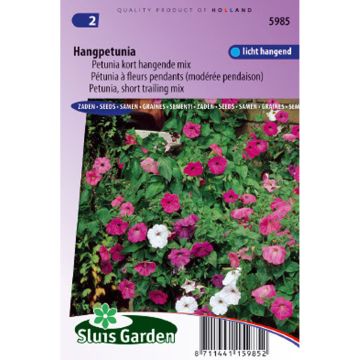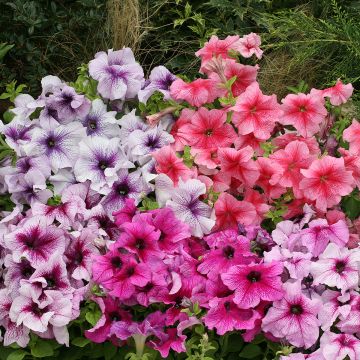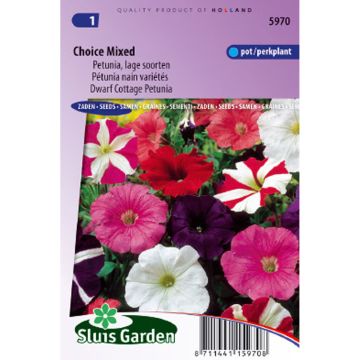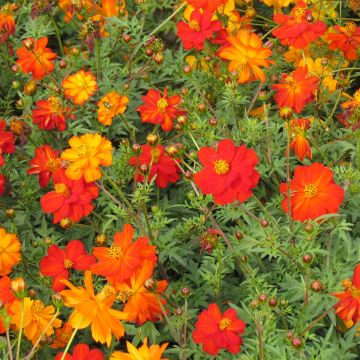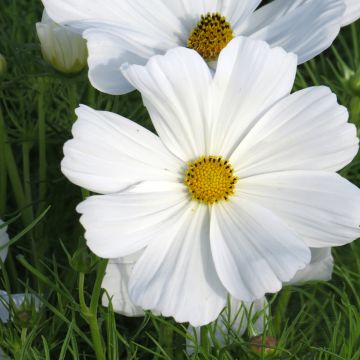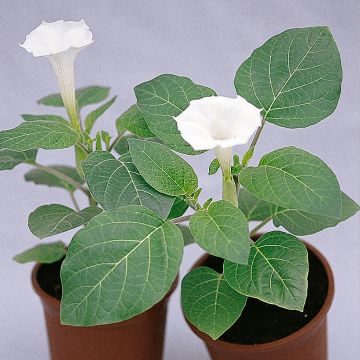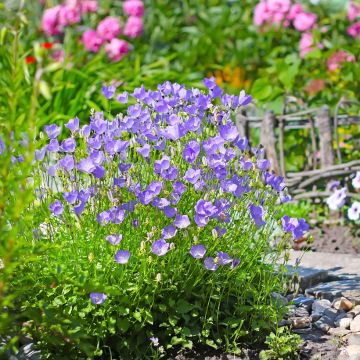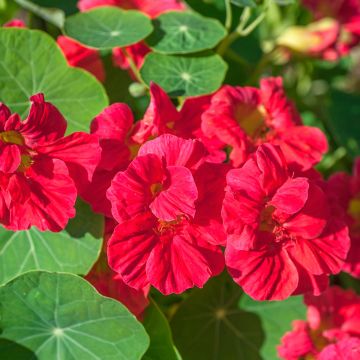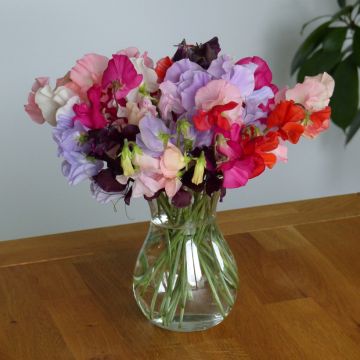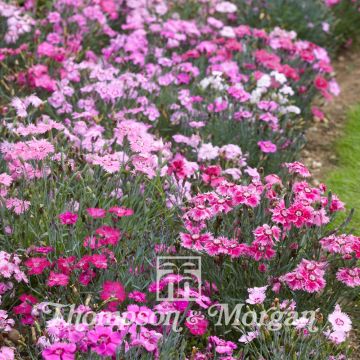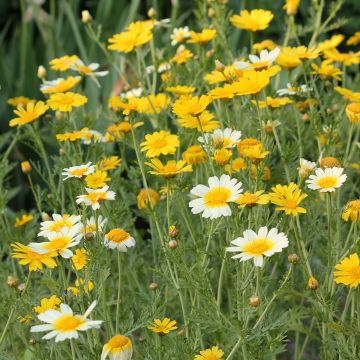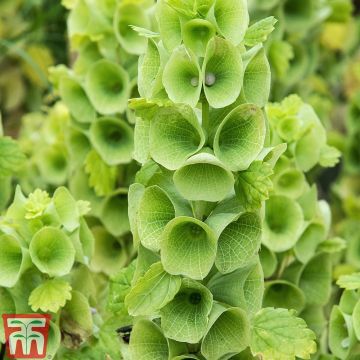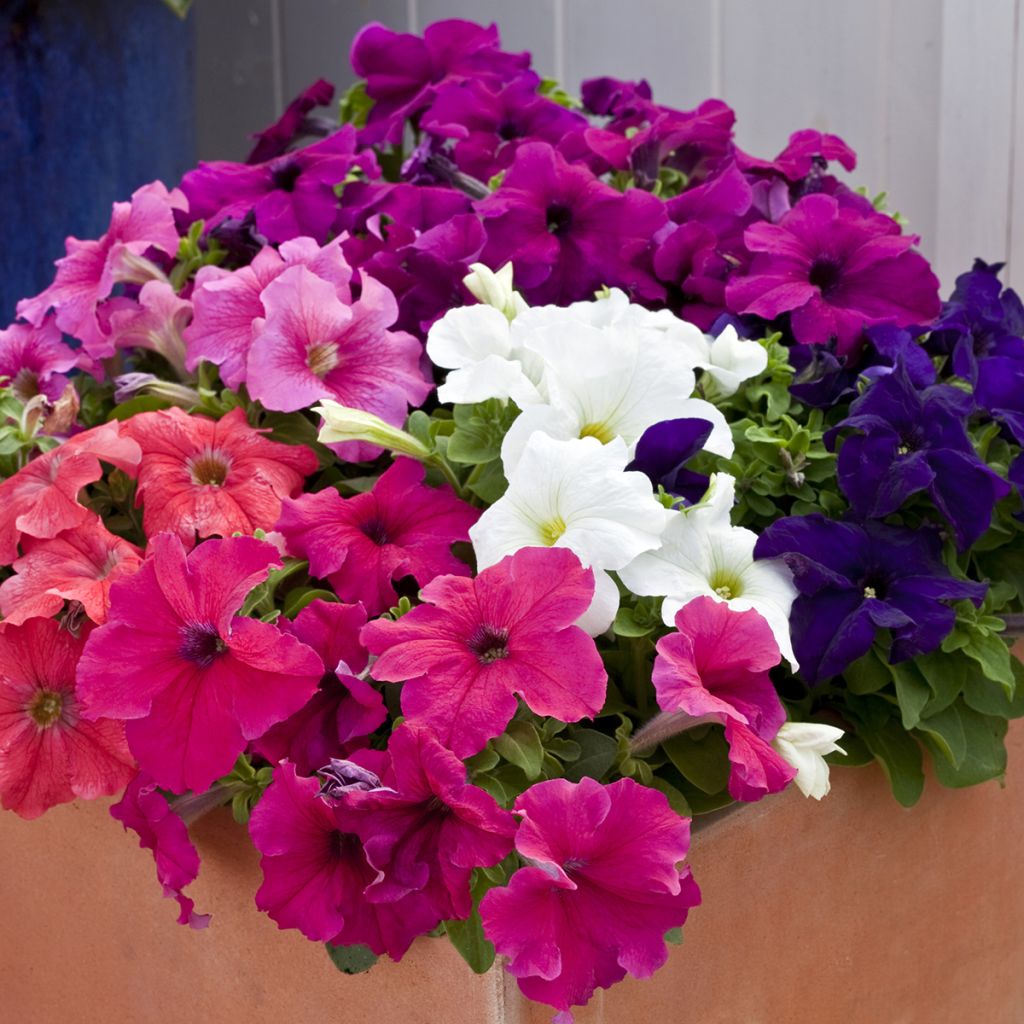

Petunia Espresso Grande Mix - seeds
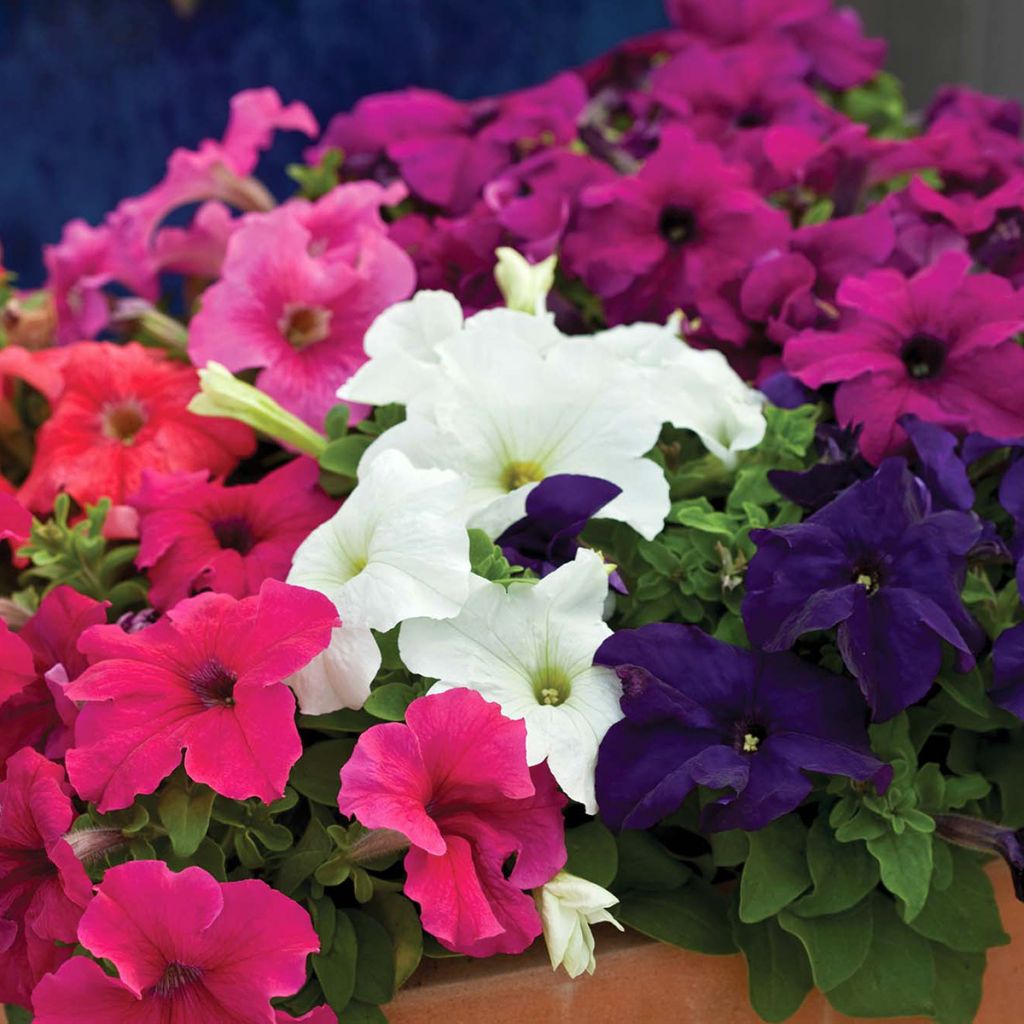

Petunia Espresso Grande Mix - seeds
Petunia Espresso Grande Mix - seeds
Petunia x Espresso Grande Mix
This item cannot be shipped to the selected country
Dispatch by letter from €3.90
More information
Schedule delivery date,
and select date in basket
This plant carries a 6 months recovery warranty
More information
We guarantee the quality of our plants for a full growing cycle, and will replace at our expense any plant that fails to recover under normal climatic and planting conditions.
Seed-only orders are dispatched by sealed envelope. The delivery charge for seed-only orders is €3.90.
Does this plant fit my garden?
Set up your Plantfit profile →
Description
The Espresso Grande Mix dwarf petunia offers you its large 10 cm diameter flowers throughout the summer. This very floriferous variety is available in a mix of colours, ranging from white to deep purple, including pink and blue. This annual, compact and generous plant will work well in your borders, pots, and hanging baskets. Sow indoors, in a warm place, from the end of winter.
From the nightshade family, the Petunia genus includes 35 species of herbaceous perennial or annual plants, native to tropical regions of South America, especially Brazil. Breeders have had a field day with varietal innovation. There are numerous varieties of petunias and other surfinias, with single or double flowers, varying in size and colour. Petunias have sticky foliage that sticks to your fingers. One characteristic of petunias is that the stems elongate during flowering. The Espresso Grande variety does not elongate and will remain compact. Its stems stay short, which means its flowers remain well above the foliage, forming a tuft 25 cm tall and 35 to 40 cm wide.
All summer long, this dwarf petunia offers large single flowers, 9 to 11 cm in diameter, in various colours: white, pale pink, pink, dark pink, blue, red and deep purple. In your hanging baskets, pair it with White Cascade Lobelia with white flowers or with Silver Falls Dichondra with silver foliage and trailing habit.
Attention, these seeds are reserved for experienced gardeners who are used to sowing very fine seeds. These seeds are as fine as dust, barely visible to the naked eye.
Report an error about the product description
Flowering
Foliage
Plant habit
Botanical data
Petunia
x
Espresso Grande Mix
Solanaceae
Cultivar or hybrid
Other Petunia seeds
Planting and care
In February-March, it is time to sow the seeds of Petunia Espresso Grande Mix. In a seed tray, place the seeds on the surface of a special compost-enriched seed compost. Place the tray at a temperature of 21-27°C to facilitate germination. You can mix the seeds with sand or light compost to sow them more thinly. Do not cover the seeds, but gently press them down to adhere to the substrate, which should be kept moist (but not waterlogged). Germination usually takes between 10 and 21 days.
When the young plants are large enough to handle, transplant them into pots and let them grow in cooler conditions. 10 to 15 days before planting them in the garden, gradually acclimatise them to outdoor conditions.
Once all risk of frost has passed, plant them in the ground or in pots, in a sunny and sheltered location, in well-drained soil.
Sowing period
Intended location
This item has not been reviewed yet - be the first to leave a review about it.
Flower seeds
Haven't found what you were looking for?
Hardiness is the lowest winter temperature a plant can endure without suffering serious damage or even dying. However, hardiness is affected by location (a sheltered area, such as a patio), protection (winter cover) and soil type (hardiness is improved by well-drained soil).

Photo Sharing Terms & Conditions
In order to encourage gardeners to interact and share their experiences, Promesse de fleurs offers various media enabling content to be uploaded onto its Site - in particular via the ‘Photo sharing’ module.
The User agrees to refrain from:
- Posting any content that is illegal, prejudicial, insulting, racist, inciteful to hatred, revisionist, contrary to public decency, that infringes on privacy or on the privacy rights of third parties, in particular the publicity rights of persons and goods, intellectual property rights, or the right to privacy.
- Submitting content on behalf of a third party;
- Impersonate the identity of a third party and/or publish any personal information about a third party;
In general, the User undertakes to refrain from any unethical behaviour.
All Content (in particular text, comments, files, images, photos, videos, creative works, etc.), which may be subject to property or intellectual property rights, image or other private rights, shall remain the property of the User, subject to the limited rights granted by the terms of the licence granted by Promesse de fleurs as stated below. Users are at liberty to publish or not to publish such Content on the Site, notably via the ‘Photo Sharing’ facility, and accept that this Content shall be made public and freely accessible, notably on the Internet.
Users further acknowledge, undertake to have ,and guarantee that they hold all necessary rights and permissions to publish such material on the Site, in particular with regard to the legislation in force pertaining to any privacy, property, intellectual property, image, or contractual rights, or rights of any other nature. By publishing such Content on the Site, Users acknowledge accepting full liability as publishers of the Content within the meaning of the law, and grant Promesse de fleurs, free of charge, an inclusive, worldwide licence for the said Content for the entire duration of its publication, including all reproduction, representation, up/downloading, displaying, performing, transmission, and storage rights.
Users also grant permission for their name to be linked to the Content and accept that this link may not always be made available.
By engaging in posting material, Users consent to their Content becoming automatically accessible on the Internet, in particular on other sites and/or blogs and/or web pages of the Promesse de fleurs site, including in particular social pages and the Promesse de fleurs catalogue.
Users may secure the removal of entrusted content free of charge by issuing a simple request via our contact form.
The flowering period indicated on our website applies to countries and regions located in USDA zone 8 (France, the United Kingdom, Ireland, the Netherlands, etc.)
It will vary according to where you live:
- In zones 9 to 10 (Italy, Spain, Greece, etc.), flowering will occur about 2 to 4 weeks earlier.
- In zones 6 to 7 (Germany, Poland, Slovenia, and lower mountainous regions), flowering will be delayed by 2 to 3 weeks.
- In zone 5 (Central Europe, Scandinavia), blooming will be delayed by 3 to 5 weeks.
In temperate climates, pruning of spring-flowering shrubs (forsythia, spireas, etc.) should be done just after flowering.
Pruning of summer-flowering shrubs (Indian Lilac, Perovskia, etc.) can be done in winter or spring.
In cold regions as well as with frost-sensitive plants, avoid pruning too early when severe frosts may still occur.
The planting period indicated on our website applies to countries and regions located in USDA zone 8 (France, United Kingdom, Ireland, Netherlands).
It will vary according to where you live:
- In Mediterranean zones (Marseille, Madrid, Milan, etc.), autumn and winter are the best planting periods.
- In continental zones (Strasbourg, Munich, Vienna, etc.), delay planting by 2 to 3 weeks in spring and bring it forward by 2 to 4 weeks in autumn.
- In mountainous regions (the Alps, Pyrenees, Carpathians, etc.), it is best to plant in late spring (May-June) or late summer (August-September).
The harvesting period indicated on our website applies to countries and regions in USDA zone 8 (France, England, Ireland, the Netherlands).
In colder areas (Scandinavia, Poland, Austria...) fruit and vegetable harvests are likely to be delayed by 3-4 weeks.
In warmer areas (Italy, Spain, Greece, etc.), harvesting will probably take place earlier, depending on weather conditions.
The sowing periods indicated on our website apply to countries and regions within USDA Zone 8 (France, UK, Ireland, Netherlands).
In colder areas (Scandinavia, Poland, Austria...), delay any outdoor sowing by 3-4 weeks, or sow under glass.
In warmer climes (Italy, Spain, Greece, etc.), bring outdoor sowing forward by a few weeks.

































